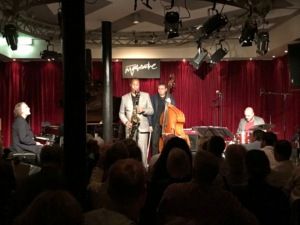Things to do
Paolo Russo and friends serve up a metaphor for life
This article is more than 6 years old.
★★★★★★

Bobby Ricketts centre stage with Paolo Russo on the left (photo: Ella Navarro)
Pop songs aren’t exactly a metaphor for life. Sure, many of them start off slowly – which is true of most toddlers’ perception of the world – but by the time they hit their second verse, it’s conformity all the way.
The music of the Italian pianist, bandoneonist and composer Paolo Russo doesn’t play by these rules. Every song is played out like a life. Joyous, sad, fast, slow, haphazard, and only occasionally routine, we do not need lyrics to know what his songs are about.
They celebrate humanity: all its triumphs, tribulations, frailties and failures. And on Saturday night at Jazzhus Montmatre, Russo took us on an odyssey of tempestuous interpretation.
A stellar line-up
The concert was entitled ‘Cinquanta’ to mark Russo’s 50th birthday, and as is fitting on such occasions he was joined by many friends on stage – six in total, and it would be a crime not to mention them all.
Italian drummer Marcello Di Leonardo demonstrated his versatility by accompanying Russo on piano when needed, while Danish double-bassist Thomas Fonnesbæk played with such aplomb he positively owned some of the later numbers.
The cameo of Italian clarinetist Nico Gori was unexpected as he just happened to be passing by, having played on Friday, but what a sound! And Serbian-Romanian accordionist Lelo Nika, ‘the Gypsy’, had clearly crossed his own palms with silver such was his impact when he dueted with Russo’s bandoneon.
But if there were two standouts, it must be Danish violinist Bjarke Falgren and American saxophonist Bobby Ricketts. Seek out Falgren because you’ve never heard anyone fiddle like this before – and with such wit in his improvisation. While Ricketts is clearly a star in the ascendancy. Remember that name, as they will be singing it at jazz venues the world over for years to come.
Maestro is right on the money
All this takes us back to the birthday boy – ‘Maestro’ to his friends – and while there was an anniversary vibe in the proceedings, this was more of a celebration of the day that Russo chose to make Copenhagen his home.
Watching him, imperiously playing the piano with slanted head – sometimes effortless-looking even though it sounds like he is playing five instruments at once – is like surveying a bird of prey in its prime, with complete control of his dominions before him.
And when he switches to the bandoneon, he opens his wings – furious flapping, clawing and precision that lets no member of the audience escape the allusion that his music is life itself.










































